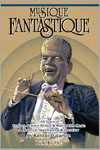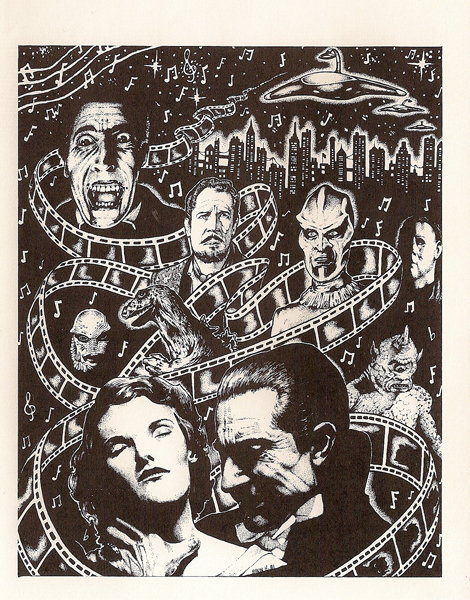September 22, 2020
Unfamiliar Music: Walter Mair on Scoring THE UNFAMILIAR
Interview by Randall D. Larson
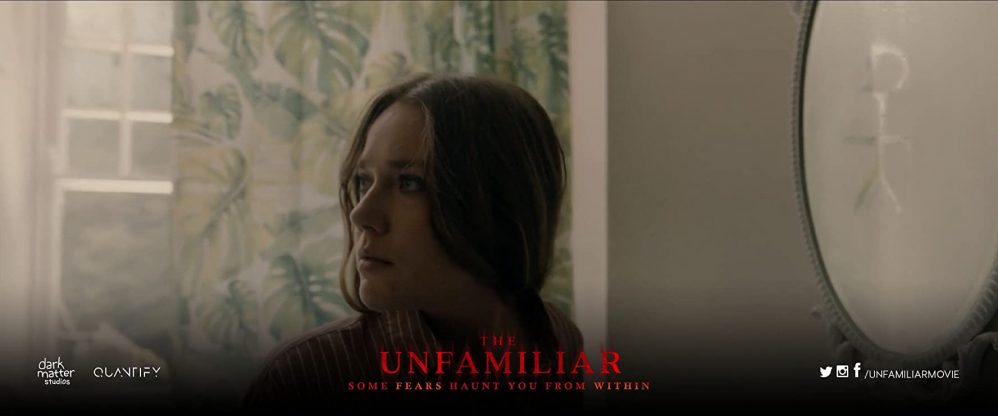
Ivor Novello nominated and Telly award winning composer Walter Mair studied in Austria, the country of his birth, gaining a degree in music composition for orchestra from the Vienna University and a major in music composition for motion pictures from Salzburg University.
He has written the music for the Universal Pictures documentary feature RONALDO, directed by BAFTA winning director Anthony Wonke. In 2016, Walter Mair scored the music for Toby Tobias’ thriller BLOOD ORANGE starring Ben Lamb and Iggy Pop. In television, he has written music for BBC 1’s CUFFS and E4’s teen drama mini-series GLUE. His music can be heard in Rockstar’s GRAND THEFT AUTO video games, Sony’s sci-fi franchise KILLZONE, Tom Clancy’s SPLINTER CELL: CONVICTION and The Creative Assembly’s TOTAL WAR series.
He writes in a wide range of styles, from large orchestral symphonic scores with choir down to smaller ensembles and also intersperses electronics and hybrid or bespoke sounds with live solo instruments.

In his recent score for the horror thriller THE UNFAMILIAR, Mair’s music incorporates original Hawaiian instruments combined with a bespoke instrument called ‘The Octo Bass’ – a custom made double bass twice the size of an orchestral double bass. Other tracks feature a live recorded string orchestra and string quartet for the more intimate and emotional scenes in the film.
Q: How did you get involved with scoring for films?
Walter Mair: It started from an early age. My mom was a singing teacher and I started learning the piano—not knowing what to do, just doing weird stuff as you do as a kid, and eventually I started teaching myself by playing songs I heard on the radio, and eventually getting into that. Then I had formal piano lessons, and later on I really got into writing electronic music.
Q: Some of your early scores were from video games and short films—how did you start getting those gigs and how did your career progress from there?
Walter Mair: After having studied in Austria I went to work in Germany for two years for a well-established composer. One of his mates worked in music-sync and they were looking for music to use for the in-game radio stations. At the time I didn’t know what the game was but it turned out for be GRAND THEFT AUTO, so I got some of the first placements on that game. Thanks to that I got to work on anther two or three GTA titles, and then came other video games. So it was kind of falling into it and eventually making a career of that.
Q: What would you consider to be some of the early milestones in your career that brought you to where you are now?
Walter Mair: That’s a very interesting question! If I could highlight one of each kind of genre or media I would say, for video games, it would be EMPIRE: TOTAL WAR [2009], a strategy game where the music ranged from influences of the Greek Empire and British Empire to America, so you I had to use a bunch of different instruments and different orchestral flavors. Then on the other hand I did a TV show called GLUE [2014] which was an amazing series for young adults where I could really write using electronic sounds and modular synths and other cool stuff. That was on the other end of the spectrum and it really opened up TV for me as a medium.
THE UNFAMILIAR: British Army Doctor, Elizabeth “Izzy” Cormack, returns from war to rekindle her relationship with her estranged family. Izzy notices numerous inexplicable activities in her house that her husband believes are due to her suffering from PTSD as a consequence of war. Izzy militantly pieces the daunting puzzle together to reveal a terrifying, invisible enemy that has infested her entire family. In a heroic attempt to save her family, she is pulled into a dark underworld in Hawaii to explore ancient mythology.
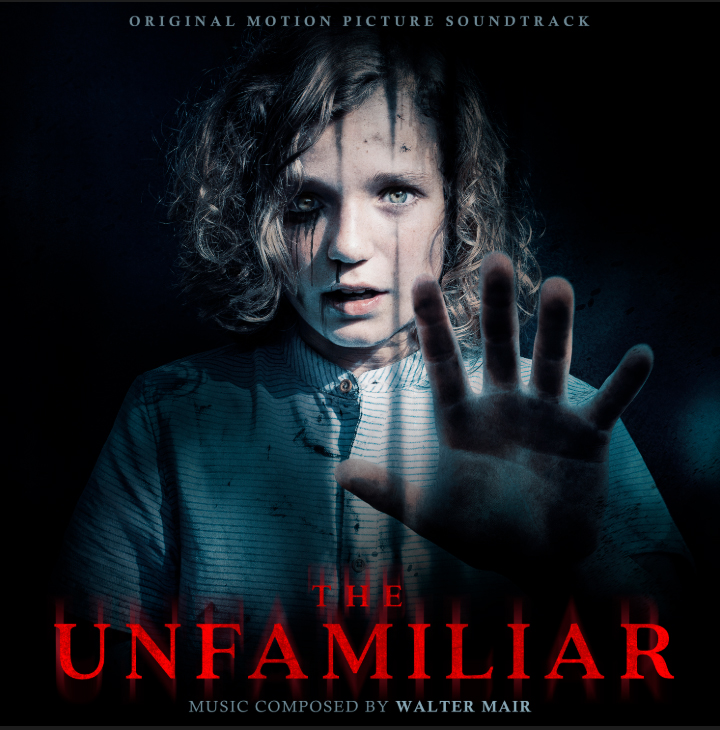
Q: How did you get involved with THE UNFAMILIAR? Your music has a very interesting mix of flavors.
Walter Mair: I was introduced to Henk Pretorius, the director, and Llewelynn Greeff, one of the producers, by the post-production supervisor. They’re like a power team, and we connected and became friends. Later I got to see the first assembly of the film, which was amazing and I really wanted to score it. That when we got talking about what music and the instrumentation should be.
Q: I like the contrast in music that the score provides—you’ve not only got the very powerful, eerie and compelling sonic structures that enhance the suspense and spookiness of the film, but you’ll also got marvelous tonal music, such as the “Sacrifice” cue, and of course you have the Hawaiian music influence as well to tie in with the Hawaiian setting and mythology. How did you develop the score around those elements?
Walter Mair: That was very interesting, because when I first listened to the temp score, there was some prepared piano in there, which was like what John Cage experimented with in the ‘70s and ‘80s. I thought it would be interesting to use something different, and I started experimenting with cello, doing some weird experiments using hand clapping and mallets, treating the cello in a non-classical way. That’s when I thought we need something more to that, maybe towards the bottom end. I used the double bass but eventually I decided that it would be best to use something custom made, specifically for this film. I found this luthier [maker of stringed instruments] in Switzerland who specialized in bespoke musical instruments. I had him custom build something he called an Octo Bass, which is twice the size of a Double Bass, the strings are the size of a finger, and it creates this deep resonance that creates a really dark soundscape. I love it, and that became the lead instrument for the score.
Q: How was the Octo Bass actually used in the score?
Walter Mair: When the instrument was bult in Switzerland we couldn’t ship it to London, so I got my assistant to pick it up with his car to drive it to Austria, where I was working from, and put in his parent’s house and start experimenting with the sound. I flew in a couple of days after and I stayed there for three weeks, and I played the instrument with strings, with metal bows, with the wooden side of a bow, I would mount metal chains to the strings because then when you play the strings, the resonance that comes from the chains creates something totally different—it’s a very dark and something you’d never hear on a soundtrack. All of that was leading up to the creating a pool of instruments—a lush string section and a more intimate sounding string quartet using the FAMES orchestra—to build a foundation of sounds. Then I ran those sounds through my modular synth rig to get vintage, old-school effects, just to create something a little more sinister. There was a huge library of sounds that I created for THE UNFAMILIAR.
Listen to the suspenseful cue “Night Marcher” (feat. Thomas Mertlseder on the Octo Bass) from THE UNFAMILIAR, courtesy of Walter Mair on YouTube
Q: How would you describe the score’s thematic orientation?
Walter Mair: There’s a lot in there. Sometimes it would be a melody played on piano, which we have in the beginning for the family scene, and later on, as I mentioned, in the “Sacrifice” cue, which takes the family theme that’s been developed over the entire film and it becomes a big, emotional payoff for the film. I had samples [<< correct?] for a string quartet and a big, lush orchestra and then mixed both together just to get the intimate sounds from the string quartet and then I would push back the quartet and push the big orchestra to the front. These elements really blended well together. On the other hand, I used modular synths and electronics to create these dark, non-melodic, sinister, and pulsating sounds. Both of these elements merge at the end to form a texture—this propelling darkness from the synths and electronic side, plus the Octo Bass, plus the orchestra. It all snowballed and became this big cacophony of really powerful elements.
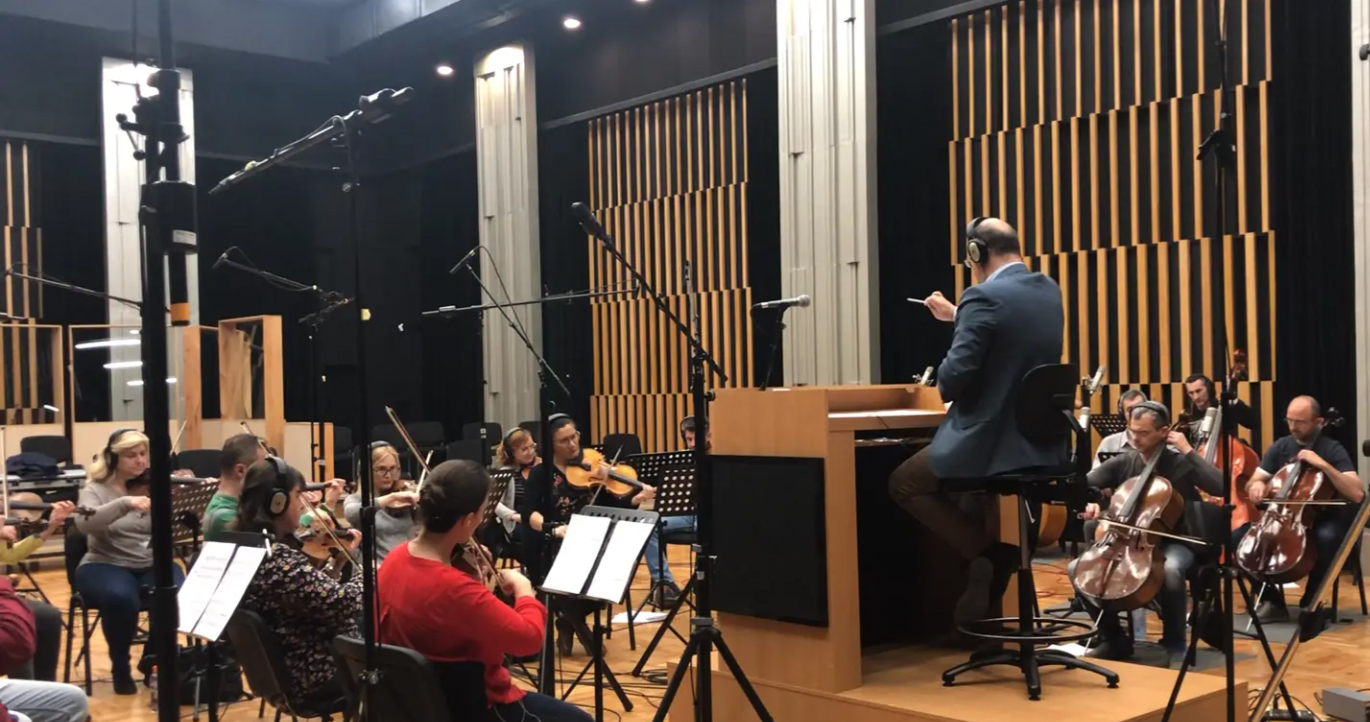
Listen to “Sacrifice” from THE UNFAMILIAR, courtesy of Walter Mair on YouTube.
Q: The Hawaiian influence is not what some might expect to be traditional Hawaiian music, and yet you’ve got these tribal elements in the score that kind of cater to that and add an interesting—not only because of the setting, since half of the film takes place in Hawaii, but it adds a rather unique musical structure to the score.
Walter Mair: That was most interesting. I start using concert elements at first—sea shells strung together that are definitely drawn towards the Hawaiian side, and also I tend to buy instruments when I am on holiday—like I went to Hawaii once and I bought this quite old, handmade guitar that was made on the islands, and it sounds unusual—it’s not a proper guitar and it doesn’t sound perfect, so I had a classically-trained guitar player use that to perform parts of my melody on it. I can only play a guitar to a certain extent, but one needs a professional to really play it properly. So it was played perfectly by this amazing guitar player but since it was an old and aged Hawaiian guitar, and it sounded so haunting and beautiful at times. So I used those guitar bits together with percussive elements, the sea shells strung together as a kind of shaker, and different drums, especially for the Tiki Totem which is a scary thing on its own when you see it at night. I used a lot of layers of those drums to really hone-in on the dark elements.
Q: You’ve scored a number of genre type films, a couple of which I want to ask about later, but this is the most demonstrably horrific score you’ve done so far, and it had a rather unique storyline as far as this body-switching ceremony and that kind of thing. How did you use your music to enhance the scarability or the horror the storyline and the events that are happening to this family?
Walter Mair: In the movie you have to have some scary moments, where the music is super loud and there are the sound effects to scare the audience, yet I don’t want to use that just for the effects. I tried to be less cliché so the sound effects wouldn’t just be loud noises, but by playing an instrument that sounds haunting and dark all on its own, I didn’t need to push it to its limits to scare the audience. All those kinds of techniques are definitely in the score. The music is ramping up for this scary moment and then there’s the big payoff and then it dips down again a bit. All of that had to be balanced with the sound design, and it was interesting to work closely with the sound design crew, to say that’s the music write for the sound design, taking the lead, so that I wouldn’t step in his toes and he wouldn’t step on my toes, so there’s this balancing between sound and music, as you’d expect in this kind of genre.
Listen to the creepy cue “Tribal Entity” from THE UNFAMILIAR, courtesy of Walter Mair on YouTube.
Q: It’s a unique kind of a score, it’s not something I’ve heard before any more than the story itself is. What would you say was most challenging for you in scoring this film?
Walter Mair: That it was not treated or labeled as a cliché. The thing is, horror soundtracks very often sound similar-ish—there’s usually a darkness the music needs to create, and I didn’t want to be cliché. That’s the reason I thought the further I could get away from using already-cliché’d sounds and do something different and a bit more unique, the more inspiring it’s going to be for me and therefore hopefully the audience is going to connect with this film in a different way.
Q: On the other side, what was most rewarding for you about scoring THE UNFAMILIAR?
Walter Mair: I have to say that the way I worked with Henk, the director, was the most rewarding, because he always encouraged me to do whatever I wanted the music to do. At times he would say “If you want it really big, don’t worry, we can even find a way to move dialogue around your music so that it can be as big as it needs to be, and at times, of course, music takes a step back and everything else tells the story. But those moments are really big payoffs. The scene with the big “Sacrifice” cue originally had dialogue at first, but by removing all the dialogue and just having the music play on its own for five minutes to really tell the story, we have such a big emotionally payoff. That’s also one of my most favorite parts in the film.
Listen to the gentle cue “The Family” from THE UNFAMILIAR, courtesy of Walter Mair on YouTube.
Q: I wanted to move back and ask you about a couple of other things on your filmography. One is a sci-fi styled thriller called LUCID that you scored last year. What can you tell me about scoring that?
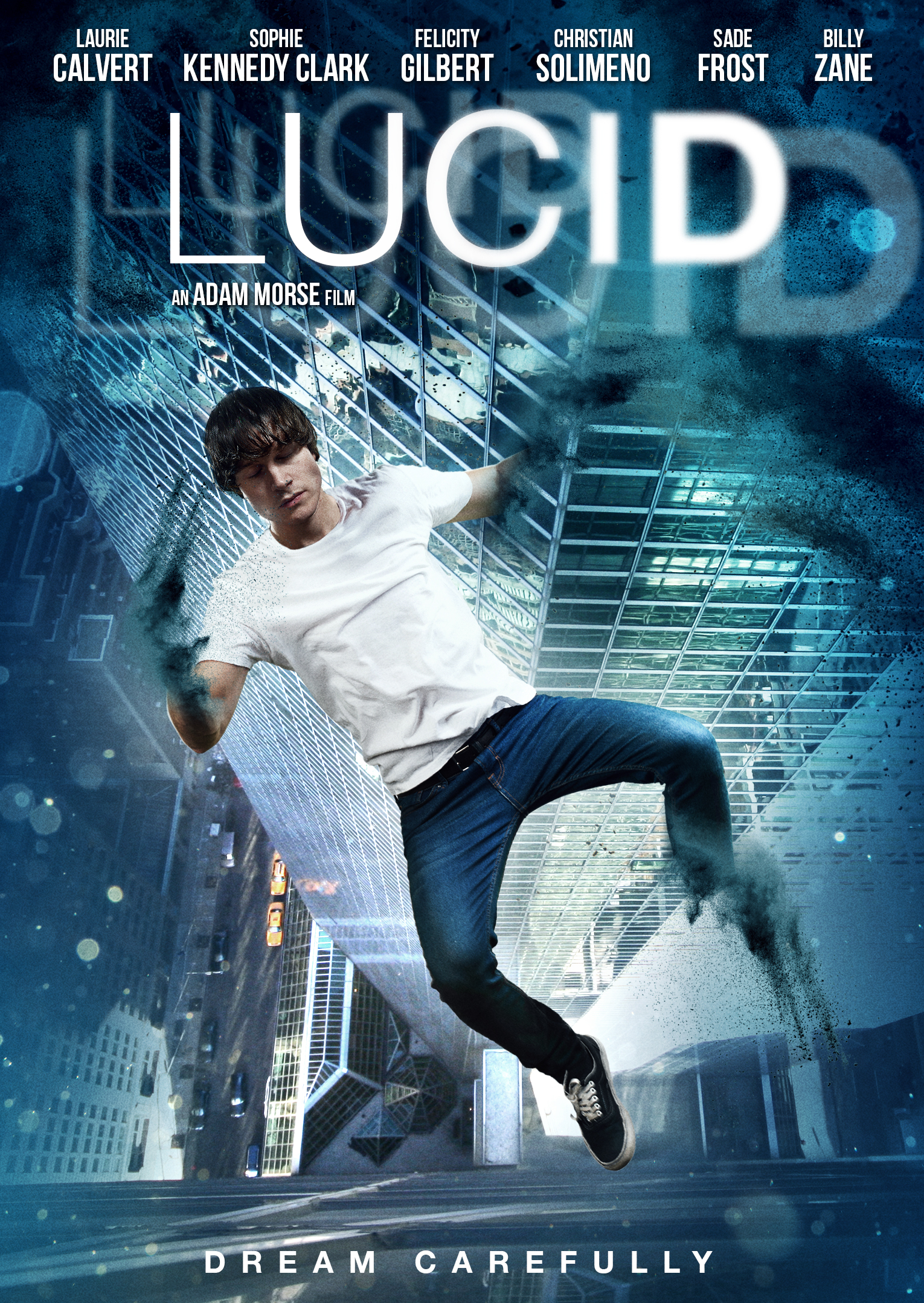
Walter Mair: That was very interesting because it sounded like a drama thriller and when I watched it for the first time after I read the script I felt there’s so much tension in there, there’s really a twist in the story, so the music itself is very electronic combined a few strings and a guitar at the end. Halfway through the film the electronic side takes over and even the glockenspiel and those instruments are used partly reversed, so you’re not quite sure at the end what actually happens, are we lost in the world of dreams, are we in reality? That’s the element I used to try and capture the sounds in LUCID, where it’s all about lucid dreaming and the main character loses himself in those dreams that he can actively control and eventually doesn’t really know if he’s in reality or in a dream. So the music had to take it on that same false pretense and then go back into something that we as the audience don’t fully understand where we are.
Q: Do you enjoy scoring genre films such as his? Where do they did in the overall list of your scores?
Walter Mair: I do, yes. Especially when it’s something that’s frightening or on the darker side like a thriller or science fiction or psychological horror like THE UNFAMILIAR. My music lends itself to that but at the same time I have this other side of me which yearns and wants to be heard and capture a more beautiful, thematic side. It’s a balance I really like between both elements.
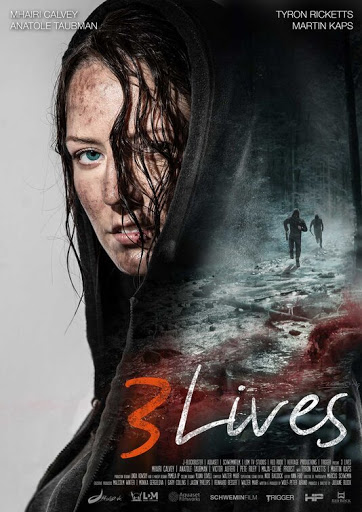
Q: Another interesting film you scored last year was 3 LIVES, a fairly tense thriller about a woman on the run from kidnappers who realizes her rescuer is the man jailed for attacking her 15 years earlier.
Walter Mair: That was a good film to score because there was a lot going on there, and yet it’s only about five characters in the woods. So the music can never be epic and big, which would only be overbearing—the music had to be sparse and intimately scored, yet has to have a lot of propelling and pulsating elements to drive the story forward and take up the narrative. I used a cello in an unusual way, combining with electronic sounds and also creating some nice, lush soundscapes that get us into the storyline from the beginning and push us forward to the end.
Q: Something else that you’re well-known for that isn’t a genre film is the Netflix docuseries FORMULA 1: DRIVE TO SURVIVE. What challenges did that series pose?
Walter Mair: That was a good challenge because it’s racing, it’s Formula 1 auto sports, so there’s going to be lots of engine noise, lots of noises in the pit stop and the garage, so how much music could there be? I spotted the first episode and I was relieved to learn than it was so much more than just the race. It’s all about the emotional background and politics of high speed auto racing. DRIVE TO SURVIVE is like the HOUSE OF CARDS for high speed sports. It’s about everything that goes on in the background, from the politics, money, new drivers, to personal lives. So it was really interesting, and the music had to span a huge emotional range from sad because someone lost the race or someone’s having a crisis in their personal life, to be transcendent and celebratory. Then we had high action music to impact the race track, and sometimes I’ll find an emotional two or three minutes where the music will take on the storytelling elements, and some kind of dreamy sequences, so the music had to span a lot of those kind of different chores within the season.

Q: You were mentioning the noise of the races and the revving of the engines, how difficult did you choose your musical moments to step in, step out, support, stay in the background or don’t have music at all?
Walter Mair: I think the decision is made before I’ve started. They’d tell me “in this race we’re going to hear the engine in the beginning and the sounds of the car racing by the camera and such, being super loud and aggressive, and then at some point we’ll be following the success or failure of one driver, and then the music would come in at some point and take over.” The sound design sets up the story but then the emotional component comes from the music when it comes in later on in the same sequence.
Q: What do you have coming up that you can discuss?
Walter Mair: There’s another feature that I’ve scored called THREE WAY JUNCTION, and that’s a drama thriller. It was shot in London and in African in the Namibian Desert, and it looks utterly gorgeous with all the amazing desert and dunes. It’s about this guy who gets lost on the desert when his car dies and he’s fighting for survival. I think it comes out hear [UK] later this year or beginning of next year. I’m just working on the soundtrack album, which is going to be released before the film comes out. That was an amazing journey because I had to evoke the busy London environment and then we go into the desert. I had the opportunity to work with the Royal Philharmonic Orchestra on that score, and we recorded them at Abbey Road Studios, so that was an amazing gig for me to have. Just to work with these talents is such a pleasure. They’ll all experts and you just give them the score and you let them lay it once and then it’s just magic. Then they play it a second time to get a safety backup take, which takes the scoring further, like “Oh my God, I need both takes in this movie!” We did that two years ago and finally the film is coming out now, which is really good news. Geoff Foster is mixing the soundtrack at the moment—Geoff is the key score mixer for Hans Zimmer’s scores, he did INCEPTION, he did INTERSTELLAR, DUNKIRK, etcetera, so THREE WAY JUNCTION is going to be a really good soundtrack. It’s going to be coming out in the next two or three months.
The digital soundtrack to THE UNFAMILIAR has been released by Lakeshore Records and is available from Amazon and other sources.
Special thanks to Andrew Krop of White Bear PR for coordinating this interview.
For more information on the composer, see his website at https://www.waltermair.com/
Watch the creepy trailer to THE UNFAMILIAR:

